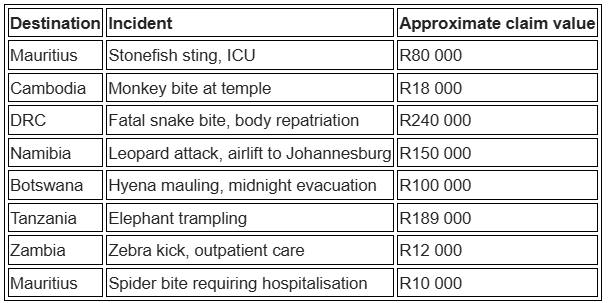
One animal attack can ruin a holiday – and they happen more often than you think
Jason Veitch, Head of Accident and Health at Santam Travel Insurance (formerly TIC) explores the frequency of animal bites and why you need good medical travel insurance cover, as SA travellers increasingly seek adventure
Animal encounters while travelling can turn dangerous in an instant - from monkey bites in Asia to snake attacks on safari. The costs and risks can be life-threatening, and treatment isn’t always available nearby. Travel insurance isn’t just a precaution - it’s essential protection when nature gets too close.
Veitch from Santam Travel Insurance says South Africans are generally adventurous travellers but he warns that too many people underestimate the risk of animal encounters – especially when the right care may not be close at hand.
He believes this trend is consistent across both leisure trips and bucket-list safari destinations. “People tend to picture animal attacks as dramatic events unfolding with the Big 5 on safari, but we’ve found that most claims come from everyday travel moments. A stonefish sting while swimming in Mauritius, a monkey bite at a Cambodian temple, a zebra kick on a guided walk in Zambia. This is ordinary travel behaviour meeting up with unpredictable wildlife.”
According to the World Health Organisation (WHO), millions of people worldwide are treated for animal bites and stings every year, with snakes, dogs, monkeys, and even insects responsible for severe illness and death. To illustrate, Veitch shares real wildlife-related claims that South Africans have experienced overseas:

“These are not once-in-a-generation freak events. We assist with cases like these every year,” says Veitch. “When treatment requires ICU care or urgent evacuation to another country, costs skyrocket. The priority then turns from physical well-being to financial concern too quickly.”
Remote locations = delayed care
Many wildlife-related injuries happen far from advanced hospitals. Antivenom and vaccines may be unavailable, so you always run the risk of these life-saving medicines being ‘out of stock’ in rural clinics, smaller islands, or bush destinations.
“With snakebites or suspected rabies exposure, time matters,” says Veitch. “A traveller might need to be flown across borders for treatment. Without the right cover, that could be financially devastating. What you need is a coordinated emergency response. That’s cover.”
Even seemingly mild encounters can be dangerous. Monkey bites, which are common in Bali, Thailand, and Cambodia, often lead to urgent rabies vaccinations and antibody treatment. Stonefish stings, on the other hand, can end in paralysis and fatal respiratory complications if not treated quickly (and correctly).
When travel insurance may not pay
There are limits, Veitch cautions. Travellers behaving recklessly by feeding animals, approaching wildlife for photos, or entering restricted areas may find their claims declined. “If you taunt a baboon for a selfie or decide to pet a wild animal, that’s not an insurable risk. We expect travellers to exercise basic caution – as well as respect for the host country and its wildlife.”
Preventing an emergency
While travel insurance plays a critical role after an incident, prevention remains the best defence. Veitch advises travellers to:
- Avoid feeding or touching wild animals
- Get rabies and tetanus vaccinations before high-risk trips
- Seek medical care immediately after any bite or sting
- Contact your insurer as soon as an incident occurs
“In remote destinations, your insurer may be the only party who can guide you to safe medical care quickly. Calling early can save your life,” remarks Veitch.
“Wildlife encounters are part of the magic of travel. A lot of the time, they’re why people go to places like the Serengeti or Thailand in the first place.”
He says the point isn’t to be afraid, it is to be prepared. “We’ve seen everything from antivenom airlifts to safari evacuations. The world is incredible and wild. And since we love to explore it, getting your insurance in order and emergency plans in place is a good place to start every adventure,” Veitch concludes.

.svg)












